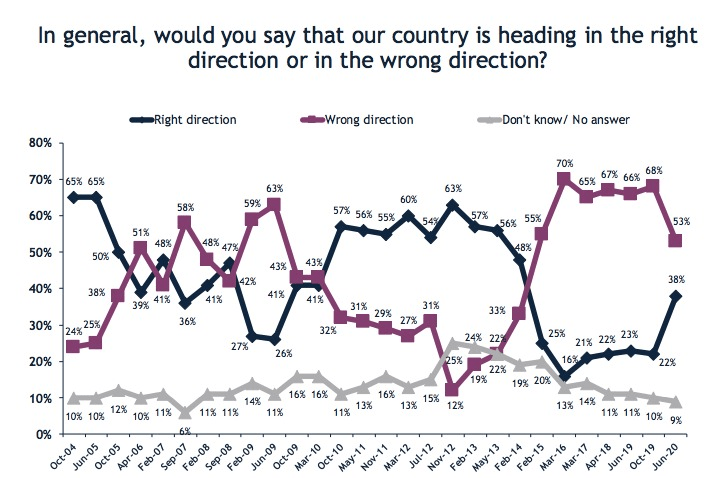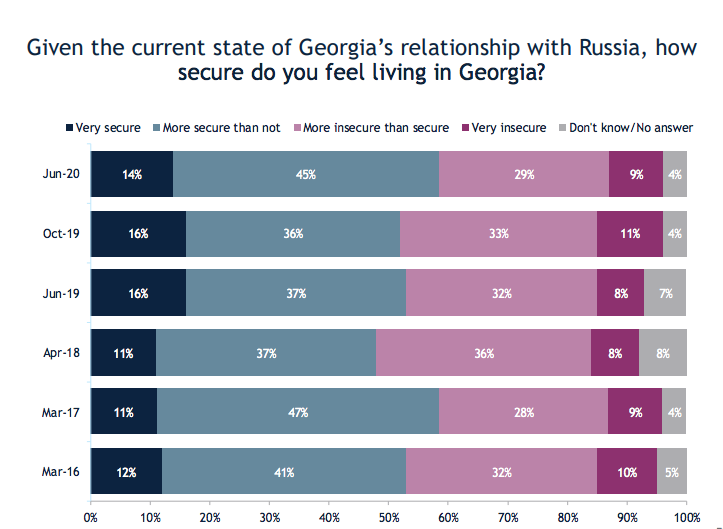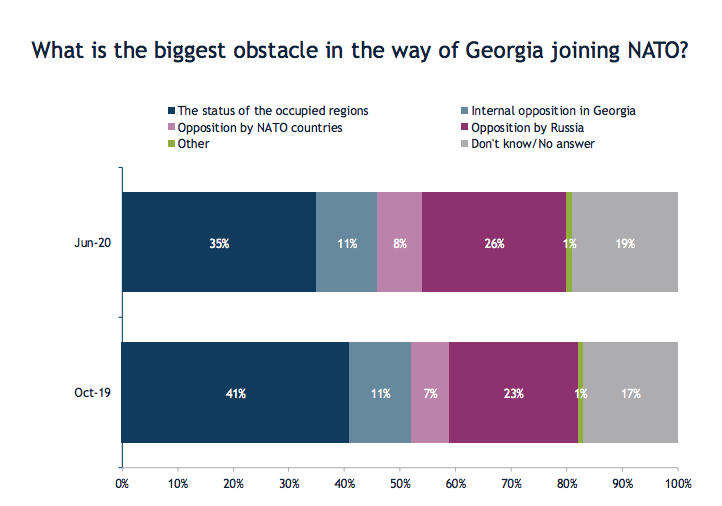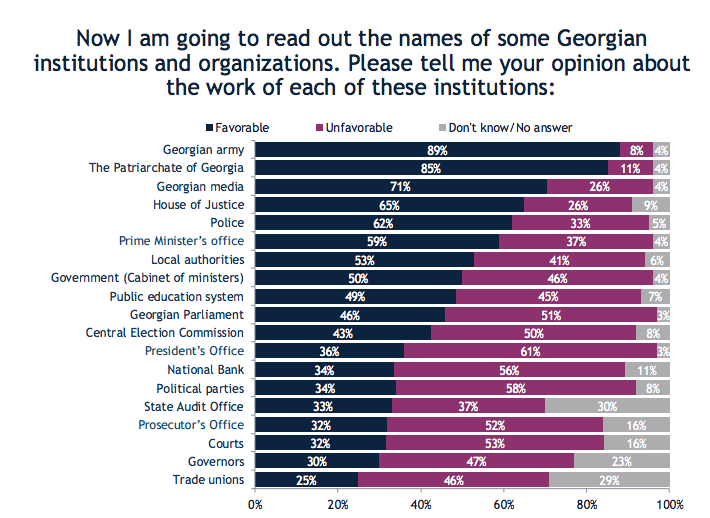
Political Ratings, Foreign Policy Attitudes in IRI Poll
With less than three months left before October parliamentary polls, 53% of Georgians say the country is going in the wrong direction, down from 68% in October, according to a new IRI poll released on August 12. Compared to the previous poll in October, the number of Georgians that see the country going in the right direction has risen by 16% to 38%.
65% of Georgians say democracy is the best form of government for the country (71% in Oct 2019), 17% claim other forms of government could fit equally well to Georgia, while 6% believe there are better forms of government.
Party Ratings
According to the part of the public opinion survey, which examines voting intentions of respondents if parliamentary polls were held this Sunday, the ruling Georgian Dream-Democratic Georgia (GDDG) has 33% support among respondents (23% in October’19), followed by its arch-nemesis former ruling party of the United National Movement (UNM) with 16% (15% in Oct’19); European Georgia – Free Democrats trail far in the third place with 5% (7% in Oct’19); New Georgia/Strategy Aghmashenebeli of Giorgi Vashadze and Alliance of Patriots have the support of 3%. Labor party, Civic Movement of Alexander Elisashvili, Lelo for Georgia, and Girchi each would receive 2%.
Noteworthy, that 17% said they don’t know who they would vote for, while 11% refused to answer.

Responding to the question “which parties, if any, would you not vote for under any circumstances” – respondents could select multiple answers – 29% said UNM, 25% – Georgian Dream, Girchi – 16%, Alliance of Patriots – 12%, Labor Party – 9%, For Justice of MP Eka Beselia – 9%, Democratic Movement United Georgia of former Parliament Speaker Nino Burjanadze – 9%, European Georgia – 7%.
Favorable/unfavorable Ratings of the Leaders
Georgian Orthodox Church Patriarch Ilia II remains the most revered public figure, with 89% having favorable and 6% – unfavorable opinion about him. Amiran Gamkrelidze, Head of NCDC Georgia enjoys 74% favorability and 17% un-favorability. For Prime Minister Giorgi Gakharia the figures stand at 63% and 31%; Kakha Kaladze, Tbilisi mayor – 57% favorable and 37% unfavorable; David Bakradze of European Georgia – 53% (favorable) and 40% (unfavorable); Shalva Natelashvili, Labor leader has 42% favorability and 51% un-favorability; Bidzina Ivanishvili, ruling party chairman is favorable for 41% and unfavorable for 51%.
President Salome Zurabishvili is unfavorable for 62% and favorable for 32%; Archil Talakvadze, Parliament Speaker is unfavorable for 52% and favorable for 34%; Mamuka Khazaradze of Lelo party is unfavorable for 57% and favorable for 27%;
Zurab Girchi Japaridze, MP Eka Beselia, and ex-speaker Nino Burjanadze are the most unfavorable for respondents, with 73%, 72%, and 66%, respectively.
Foreign Policy, NATO and EU Membership
In regards to Georgia’s foreign relations, 94% of respondents say Georgia has good relations with the U.S. The figure stands at 93% for the EU, 84% – for Ukraine, 78% – for Turkey, 71% – for Armenia and 68% for Azerbaijan.
Russia remains to be the main foe in the eyes of Georgians, with 84% considering Georgia’s relations with its northern neighbor as bad, while 6% evaluate Russo-Georgian relations as good. 82% of respondents see Russia as the greatest political threat, while 70% named it as the greatest economic threat to Georgia.
72% of respondents said Russian aggression toward Georgia is still going on, 18% noted that it is over but likely to resume.

The U.S. is regarded as the greatest political (65%) and economic partner (51%) for Georgia, followed by the EU with 51% and 37%, respectively.
As for the Georgian Dream administration’s handling of relations with Russia, 23% of Georgians see it ‘very negatively,’ 29% see it as “somewhat negatively,” while 6% and 33% regard it as “very positively” and “somewhat positively”, respectfully.40% of Georgians fully support further dialogue with Russia (down from 83% in November 2012 and from 48% in October 2019); 35% somewhat supports it; 8% and 14% opposes to it somewhat and strongly, respectively.
Regarding NATO membership, 56% fully supports entry into the Alliance (up 5% since October 2019), 22% somewhat supports it (2% higher than in Oct 2019); Respondents named security (19%), defense (18%), strengthened economy (12%) and return of lost territories (9%) as the main benefits of joining NATO.
51% said Georgia should only join NATO when the occupied regions are fully integrated, while 30% says Georgia should join the alliance even if Abkhazia and Tskhinvali regions are not fully reintegrated.

Support for EU membership is higher, with 64% (5% up since Oct 2019) fully backing Georgia’s bid to enter the 27-member bloc, while 23% somewhat supporting it. 43% said a strengthened economy is the main benefit of joining the EU.
37% of the respondents say Georgia’s foreign policy should be “only pro-European Union and the West,” 45% believe it should be “pro-Western but keep up relations with Russia;” 6% say it should be “pro-Russian but keep up good relations with the EU and the West,” while 2% would rather see Georgia being “only pro-Russian.”
Government, Institutions, Trust
25% of the surveyed persons say the fight against coronavirus is the main accomplishment for the Georgian Dream-led government; 7% regards healthcare reform as GD’s main achievement during its 8-year-long tenure, followed by freedom of speech – 3%. 15% say GD administration has no achievement, while 32% don’t know or refuse to answer.
Speaking of GD’s biggest failures, 9% name false promises, 7% – economic decline, 6% – unemployment, June 20, 2019 events – 6%, 4% – occupied territories, 4% – rising poverty.
Georgian army tops the list of most favored institutions with 89%; the Georgian Orthodox Church comes the second with 85% having favorable and 11% having an unfavorable opinion about it. Georgian media is the third with 71% favorability. Courts, governors, and trade unions have the least “favorability” with 32%, 30%, and 25%, respectively. The President’s Office is the most unfavored institution with 61%.

Speaking of popular perceptions of the level of impact non-governmental organizations enjoy on government policy, 11% says NGOs have a great impact on government policy, 32% says there is “some impact,” 27% believe NGOs have little impact in this regard, while 16% think NGOs have no impact on it.
This post is also available in: ქართული Русский